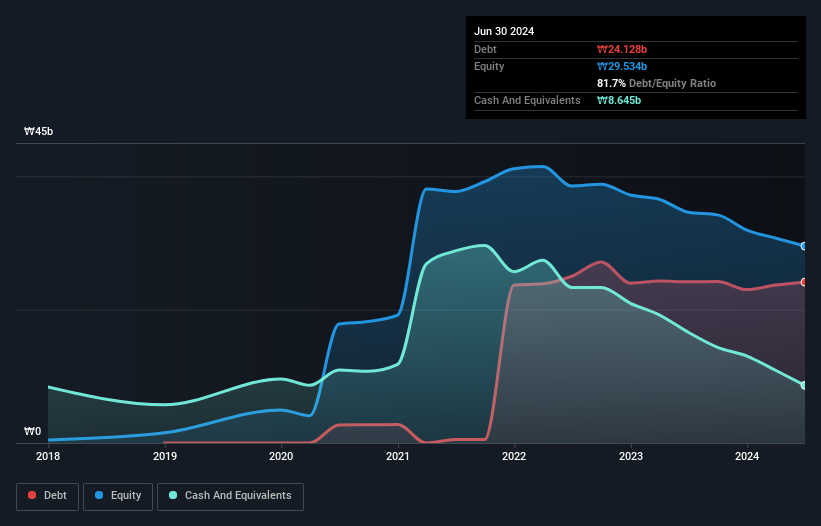Warren Buffett famously said, 'Volatility is far from synonymous with risk.' So it seems the smart money knows that debt - which is usually involved in bankruptcies - is a very important factor, when you assess how risky a company is. Importantly, NBT Inc. (KOSDAQ:236810) does carry debt. But should shareholders be worried about its use of debt?
When Is Debt Dangerous?
Generally speaking, debt only becomes a real problem when a company can't easily pay it off, either by raising capital or with its own cash flow. Ultimately, if the company can't fulfill its legal obligations to repay debt, shareholders could walk away with nothing. However, a more common (but still painful) scenario is that it has to raise new equity capital at a low price, thus permanently diluting shareholders. Of course, plenty of companies use debt to fund growth, without any negative consequences. The first thing to do when considering how much debt a business uses is to look at its cash and debt together.
Check out our latest analysis for NBT
What Is NBT's Debt?
As you can see below, NBT had ₩24.1b of debt, at June 2024, which is about the same as the year before. You can click the chart for greater detail. However, it does have ₩8.64b in cash offsetting this, leading to net debt of about ₩15.5b.

How Strong Is NBT's Balance Sheet?
Zooming in on the latest balance sheet data, we can see that NBT had liabilities of ₩39.5b due within 12 months and liabilities of ₩3.55b due beyond that. Offsetting these obligations, it had cash of ₩8.64b as well as receivables valued at ₩10.3b due within 12 months. So its liabilities total ₩24.1b more than the combination of its cash and short-term receivables.
This deficit isn't so bad because NBT is worth ₩54.3b, and thus could probably raise enough capital to shore up its balance sheet, if the need arose. But we definitely want to keep our eyes open to indications that its debt is bringing too much risk. When analysing debt levels, the balance sheet is the obvious place to start. But you can't view debt in total isolation; since NBT will need earnings to service that debt. So when considering debt, it's definitely worth looking at the earnings trend. Click here for an interactive snapshot.
In the last year NBT had a loss before interest and tax, and actually shrunk its revenue by 3.7%, to ₩105b. That's not what we would hope to see.
Caveat Emptor
Over the last twelve months NBT produced an earnings before interest and tax (EBIT) loss. Indeed, it lost a very considerable ₩5.8b at the EBIT level. Considering that alongside the liabilities mentioned above does not give us much confidence that company should be using so much debt. Quite frankly we think the balance sheet is far from match-fit, although it could be improved with time. Another cause for caution is that is bled ₩5.1b in negative free cash flow over the last twelve months. So suffice it to say we consider the stock very risky. When analysing debt levels, the balance sheet is the obvious place to start. However, not all investment risk resides within the balance sheet - far from it. For example NBT has 3 warning signs (and 2 which don't sit too well with us) we think you should know about.
When all is said and done, sometimes its easier to focus on companies that don't even need debt. Readers can access a list of growth stocks with zero net debt 100% free, right now.
Valuation is complex, but we're here to simplify it.
Discover if NBT might be undervalued or overvalued with our detailed analysis, featuring fair value estimates, potential risks, dividends, insider trades, and its financial condition.
Access Free AnalysisHave feedback on this article? Concerned about the content? Get in touch with us directly. Alternatively, email editorial-team (at) simplywallst.com.
This article by Simply Wall St is general in nature. We provide commentary based on historical data and analyst forecasts only using an unbiased methodology and our articles are not intended to be financial advice. It does not constitute a recommendation to buy or sell any stock, and does not take account of your objectives, or your financial situation. We aim to bring you long-term focused analysis driven by fundamental data. Note that our analysis may not factor in the latest price-sensitive company announcements or qualitative material. Simply Wall St has no position in any stocks mentioned.
About KOSDAQ:A236810
NBT
Provides mobile advertising services using smartphone applications in South Korea.
Mediocre balance sheet and slightly overvalued.
Market Insights
Community Narratives




